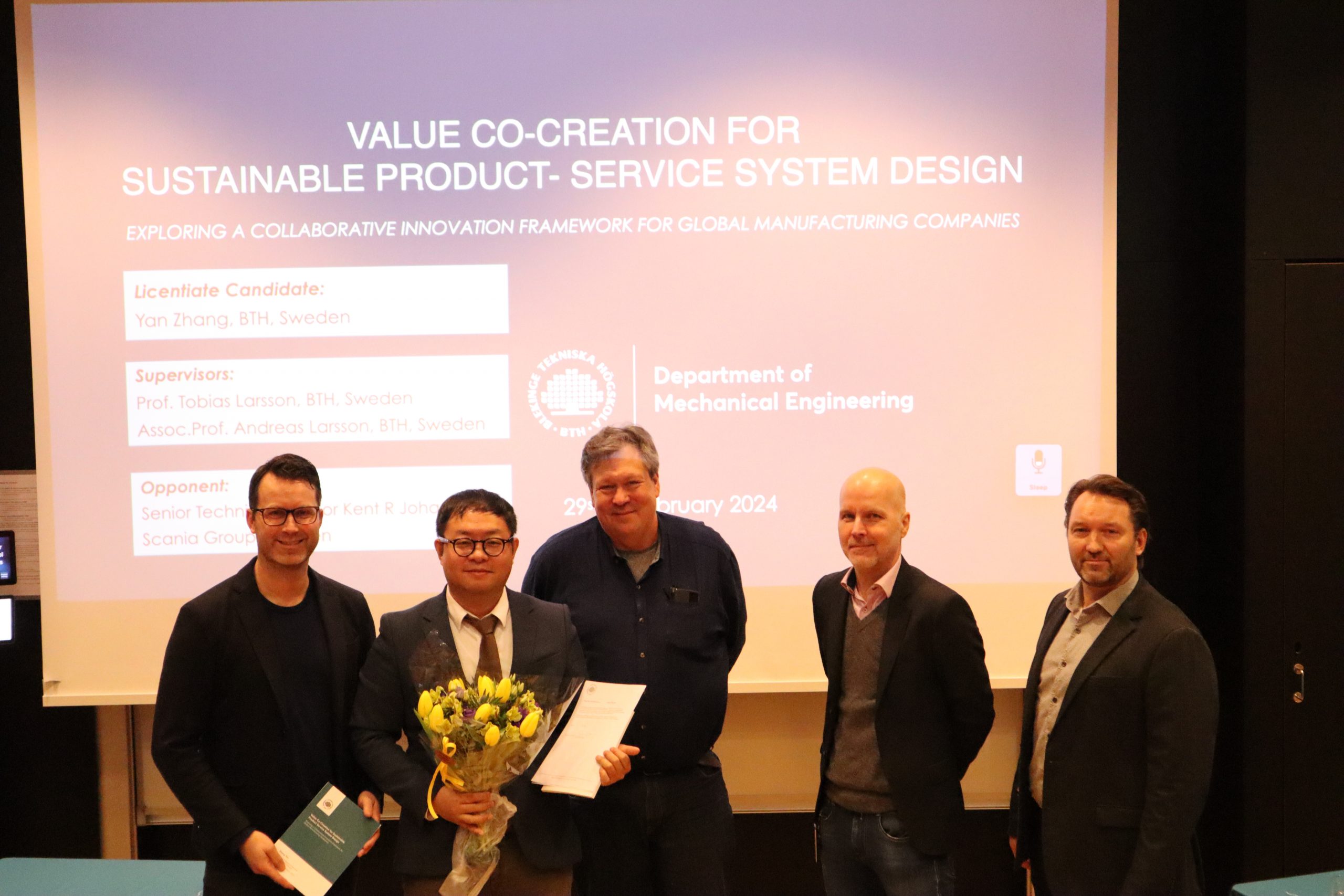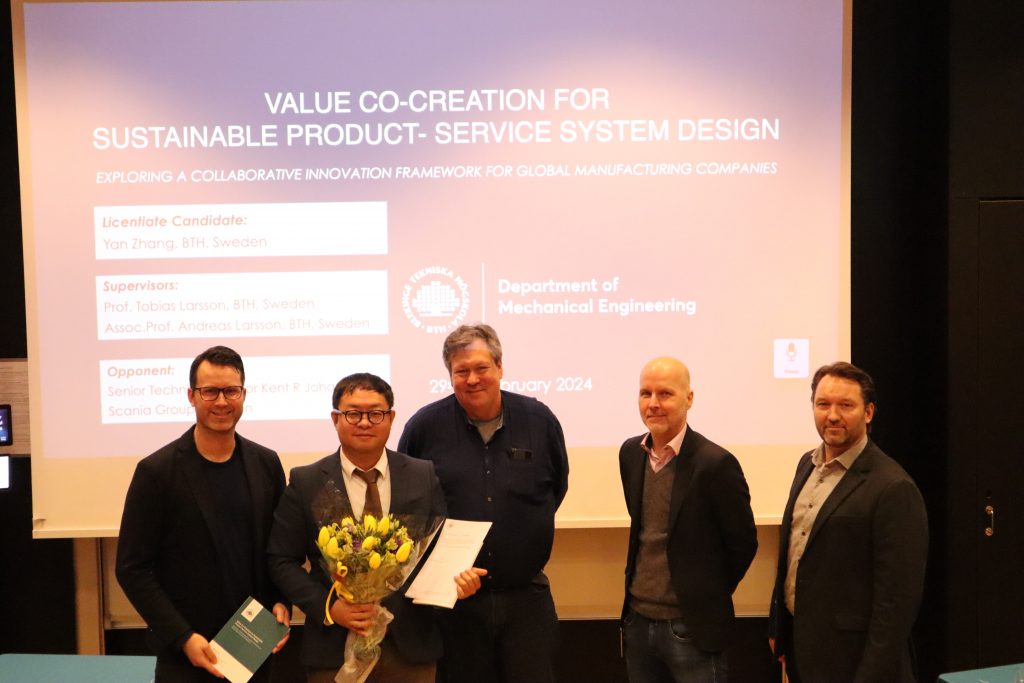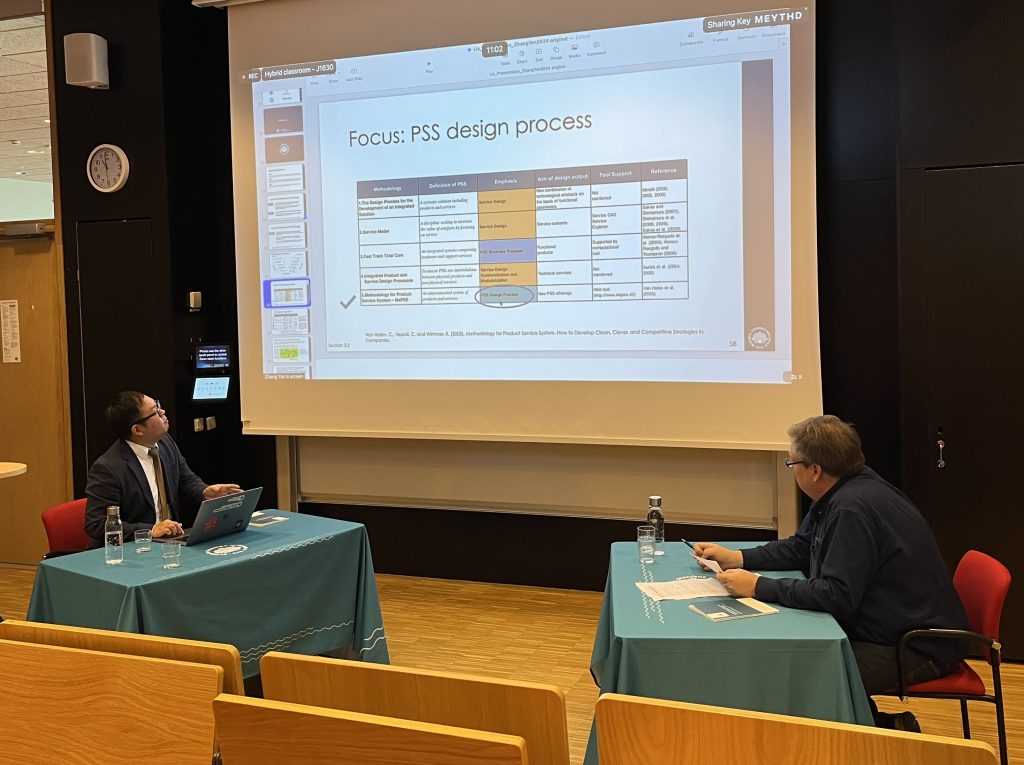
Congratulations Yan Zhang, Licentiate in Mechanical Engineering!
- Post by: Tobias Larsson
- 29th February 2024
- No Comment
Yan Zhang presented his licentiate thesis entitled “Value co-creation for sustainable product service system design” in front of a crowd of local audience and online listeners.
Yan made a popular presentation of the background of his research and the findings up until this point, where the servitization of industry is a driving force for digitalisation and value creation for the manufacturing firm. The thesis consists of a summary part and thre individual research publications and the presentation of the thesis landed in a summary of his findings. Yan has been working within applied research projects at BTH like MD3S and with companies as Volvo Construction Equipment, Volkswagen while being industrial PhD candidate at his company in Shanghai, China.

Opponent for the day was Senior Technical Advisor Kent R. Johansson of Scania Group. Kent with extensive career in CAE support for product development served as an excellent opponent that dug deeper into the applicability around the proposed framework from Yan, and also making sure it was clear on the choices Yan hade made in his research. The discussion turned out to be a valuable reflection session for both Yan and the audience.

At the end also the audience had the chance to ask questions on the research.
Examiner Professor Tobias Larsson then concluded by declaring that Yan had passed the exam and achieved the licentiate degree. The event was rounded up with classic swedish fika!

Thesis abstract
There is a gradually spreading servitization trend that is forcing industrial manufacturing companies acting in the global market to rethink their business. Manufacturing companies that were traditionally perceived as product-centered, are today increasingly influenced by a service-oriented theory, which claims that manufacturing companies are driven to shift their business focus towards a strategy where customer-perceived value is in the spotlight, and where products are bundled with services to offer Product-Service Systems (PSS). The need to integrate several knowledge domains (i.e. product development, service development, recycling, etc.) means that industry companies need to move “downstream” knowledge from the entire lifecycle into the early phases of the PSS design process where critical decisions are made. At the same time, this raises the awareness of, and requirements for, methods and tools that support cross-disciplinary team collaboration in the process of designing these PSS solutions. Value co-creation is one strategy to address customer collaboration to develop PSS in a framework that allows different stakeholders to participate in defining design concepts and finding the optimal combination of hardware and service that supplies the desired value. Value co-creation strategy and global collaborative innovation are essential for manufacturing companies to explore new ways of designing PSS.
The thesis summarizes the research performed by the author, as an industrial Ph.D. student and director for system innovation at BIGmind Innovation. This thesis aims to study and explore the motivation for, and challenges of, working with value co-creation for PSS design by global manufacturing companies. Firstly, the empirical research determined that there are different challenges that global manufacturing companies and product development face when designing PSS. The work involves exploring value co-creation via a customer collaborative design platform and experience prototyping for product-service system design. The research shows that there is a lack of knowledge about guidelines and processes for collaboration in value co-creation. The research emphasizes that the PSS design methodologies of today neglect to specify the roles and responsibilities of the actors who co-create PSS offerings, and there is a lack of understanding of the entire process and how it is implemented in industrial practice when developing solutions.
Conclusions from this work suggest that government policies can make a fast and major impact on the demand for innovations and PSS development. Additionally, a value co-creation approach promotes large-scale user participation in the early phase of PSS design. To enhance stakeholder participation and gather feedback, experiential prototypes were utilized during the conceptual design phase of the PSS design. To support further development in the area of value co-creation, the Future Innovation Framework (FIF) is proposed as a mechanism to facilitate the adoption and use of value co-creation of PSS design. This thesis discusses the implications, opportunities, and challenges of the FIF for industrial PSS design. The thesis concludes with a discussion on the possibility of using value co-creation for PSS design in different industry domains in the future.
Keywords: Product-Service System, Manufacturing company, Innovation Framework, PSS design, Value Co-creation, Case study
Thesis link: https://urn.kb.se/resolve?urn=urn:nbn:se:bth-25612
